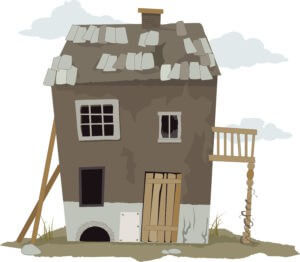 A couple of years ago I did a post on the cost of construction. It was really geared towards the question of why we weren’t seeing much in the way of new construction. Residential real estate market has recovered a fair amount since, yet we still aren’t saying much in the way of new construction.
A couple of years ago I did a post on the cost of construction. It was really geared towards the question of why we weren’t seeing much in the way of new construction. Residential real estate market has recovered a fair amount since, yet we still aren’t saying much in the way of new construction.
Why???
***If you want to skip the story about my project, skip down to the numbers section towards the end of the post.***
Recently, I completed a small home (576 Sq feet, plus a loft) in downtown Driggs. I kept a very thorough expense ledger. I tried to keep track of every expense possible, even miscellaneous trips to the hardware store. (you can’t keep track of all of ’em)
I categorized my expenses the best way I knew how. I am not a builder. Oftentimes I went home and studied YouTube videos or how to’s. My friend Kane with Old West Log homes was probably about sick of my questioning as well.
I didn’t really plan on building the house myself. I wanted to be the general contractor, check up on things with periodic trips from the office when I had time, and keep track of my expenses. I thought I would stay relatively close to my budget, complete the home by mid August, and go on with life.
Hahaha…
Things started out reasonably well, until I discovered that my sewer line was an old asbestos line with no easements. Fortunately I have some good neighbors who were willing to provide those easements, but it did cost me a fair amount in excavation work to get all of the new lines installed as you will see. Setback, oh well. Foundation went smoothly. I put the sealant on the outside, the excavators backfield, built me a driveway, and we were moving along nicely.
Setback number 2, things didn’t work out with the framing contractor I chose to work with. Nice guy, it just didn’t work out. I noticed some things were a bit “off”. Out of plumb here, not square there. If you haven’t noticed from the way I kept track of my expenses, I can be a bit compulsive at times. I paid them for the work they had done, repaired or ripped out what I didn’t like, and thought what the heck – I had framing experience working summers during school, I’ll finish the framing.
Without going into too much detail, I decided it best to try to get back to the plan. Though the framing turned into me staining and siding the exterior, I decided I would hire a plumbing company to rough in the plumbing, and I have a good friend who is an electrician. I wouldn’t say I didn’t get my hands dirty, but I did pay people to do things believe it or not. Next came the insulation. You’ll probably think it looks a bit expensive if you are an experienced builder, but I did use some high-quality foam insulation in areas. Roof. I can do it. Sure enough, there I am with 25 foot long sections of roofing dangerously close to the overhead electrical lines common in Driggs. I remember when I was sticking the ice and water shield down there was extremely high winds that day. Of course.
Okay, I’m worn out doing things myself at this point, time to hire out a few more projects. I double checked all of the blocking in my framing to make sure I had attachment points for things like cabinetry and handrails. I called in the sheetrock guys. They put up sheetrock so incredibly fast I couldn’t believe it. They had a tool called a “bazooka” where they taped the seams faster than I ever thought possible. Tape, texture, done. I had them hold the sheetrock down 3/4 of an inch so I could install my tongue and groove pine ceiling I had been staining in my garage this whole time. On that note, I pre-stained everything, both sides. All in my garage with an industrial airless sprayer. A bit of advice, put you’re ceiling up first, then drywall. I couldn’t really help it because I had set in motion the cabinet installer and some other things that needed sheetrock, but it sure made it a pain to install that ceiling. I was short on help working after hours after leaving the office, so I bought a little laser measuring tape so I could pull measurements myself.
Next was cabinet install, countertops, and finish work. Fortunately I had a great cabinet guy that did a good job. He was able to get things installed, the countertop guys came in without a hitch, no problems. I wasn’t excited to keep doing things on my own, and the project was really starting to drag out. However, the flooring guys I had lined out, and my trim carpenter bailed. Here we go…
I decided to paint first so I didn’t have to tape off the floors. Two layers of primer, two layers of paint. Next was the flooring. Thinset, hardboard, tile. I remember struggling with the in floor electric heat I put in the bathroom, what a pain. Back out with the airless sprayer to stain the interior trim and doors. I decided to save a little money and do pine. I also chose to do clad casement windows, and made the mistake of not masking them throughout the construction process. There I was sanding off dirt, grime, and leftover insulation. I taped off the windows, and stained the casements. The trim went up as the weather was taking a turn, and I didn’t have room for to take my saw inside. I remember setting up a little tent to protect the freshly stained finish trim.
I had a vacation planned with my family towards the end of November. It was taking a toll on all of us, and I was committed to completing the project before leaving on vacation, I think I worked until 4AM one night. The landscapers came in through October and installed the sprinkler system and sod. I think it was around November 1st when they finally rolled out the sod, but it took well.
***The Numbers***
I mentioned above that I kept pretty good track of everything I spent. A couple of things you would need to adjust for a real world application:
1) I didn’t have to pay a connection fee to the city of Driggs. Had I, the permit section below would be substantially higher, probably between 7 and 10,000. I did have to pay more for excavation than I had originally thought because the sewer lines were running through property without an easement, and they were old asbestos lines. I think you could call it a wash between what I spent more on excavation, vs the hook-up fees, assuming you didn’t have problems either.
2) If you read the story above, I did fair amount of the construction myself, therefore didn’t pay a general contractor or a fair amount of Labor. I will add those fees towards the end of the costs below.
3) I splurged on some finishes that really weren’t necessary with regards to flooring, granite, and a few other things. Siding could have been done less expensively, but I didn’t do any fancy stone, or log accents. I think I would call it a wash.
4) I built an incredibly small home. You will hear from most builders that it costs less per square foot to build a larger home for obvious reasons. The bulk of the expense goes into kitchens and bathrooms, it’s cheaper to build bedrooms. Since this is a one-bedroom cabin, I think the price per square foot would go down as the home size goes up.
Cost Breakdown
Plans
825
Engineering
***N/A, add per plan specifications
City Permits (does not include water & sewer hookups)
4537.42
Excavation
14178.61
Foundation & Misc Concrete
6109.67
Building Materials (Lumber, Flooring, etc.)
21181.72
Steel & Roofing
5063.19
HVAC (HRV System)
872.34
Propane Tank & Install (Leased Tank)
756.97
Plumbing (Parts & Labor)
7154.88
Insulation
5123.23
Labor (Electrical, misc help, rental equip, drywall)
10000.55
Windows & Doors
10960.40
Landscaping
5364.87
Cabinets
9936.43
Handrail Systems
3843.41
Flooring (Tile & Hard Board)
4377.14
Appliances
4622.33
Window Coverings & misc Finish Materials
1688.73
***Labor: This is the only wild card here. Since I did so much myself (some framing, misc projects, some electrical, ceiling, flooring, trim, siding, windows, cleanup) it would be hard to breakdown. I have heard ratios of 2:1 to 3:1 for materials vs labor. You will notice about 10,000 in labor above, which included drywall, tape, texture, electricians, and misc laborers.
Allowance for labor
15,000
Grand Total: $131,596.89
To summarize, I’m coming to the same conclusion I did a couple of years ago. The gap is narrowing regarding current home prices vs construction costs, but it’s still tough. I’m coming in at about $200 per square foot. Remember building a larger home will be less expensive. I spent a little more than I needed to on certain things like cabinets, insulation, and a few miscellaneous finishes like wood ceilings. I didn’t really well, but I did have the additional expenses with the excavation. Still, this doesn’t include the price of the land.
That said, do I think you could build a small house for significantly less than I did? Probably. Do I think you could build a 3 bedroom, 2 bathroom home for $100 a square foot? Personally, no.
I know there isn’t much on the market, we are all feeling the crunch. Regardless comma I am seeing prices less than 150 per foot, pre-existing, including a lot. That said, I do expect to see continued recovery.

